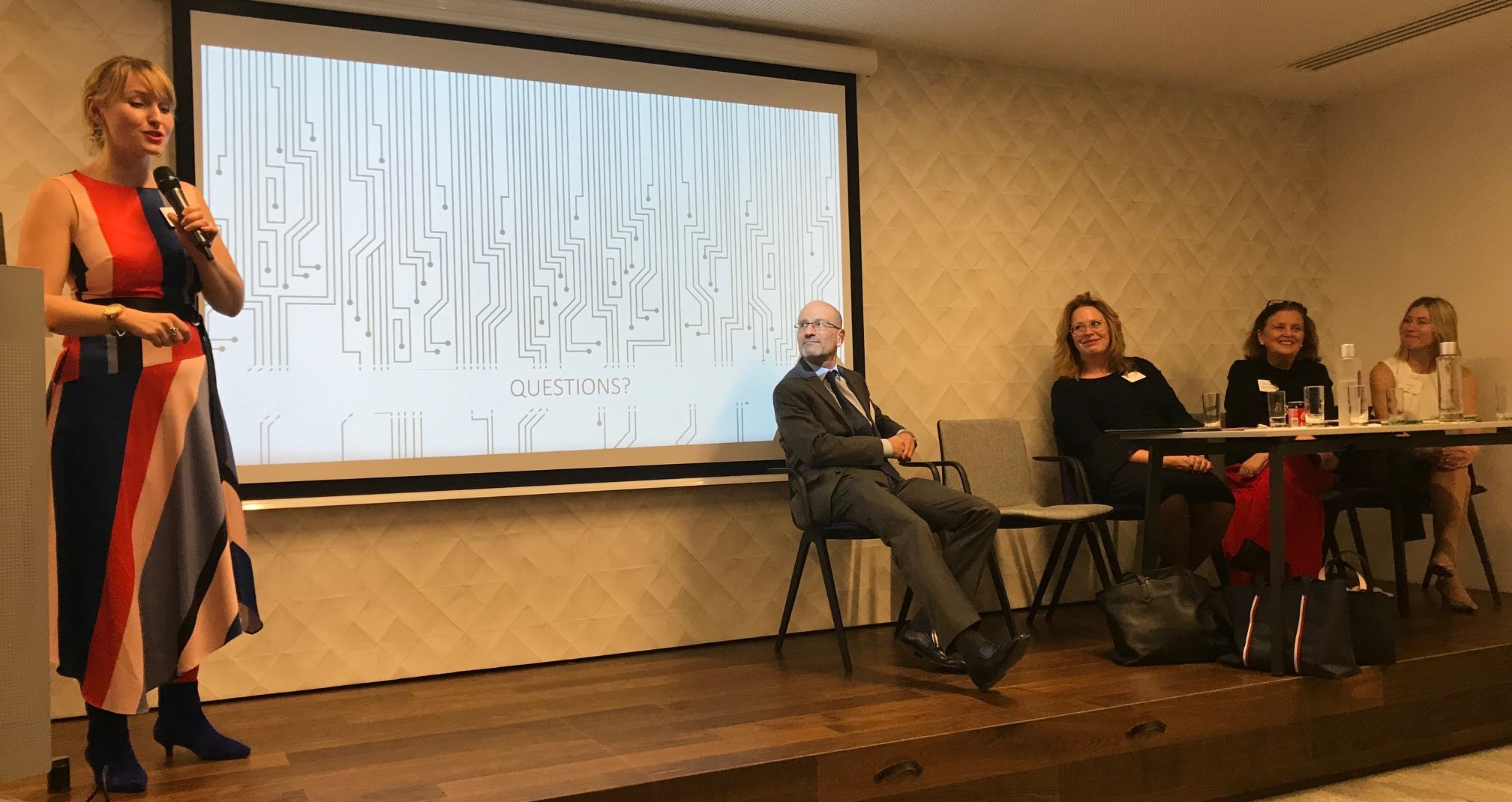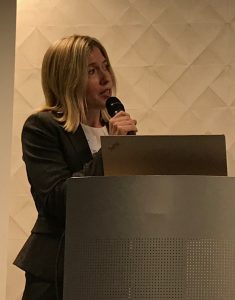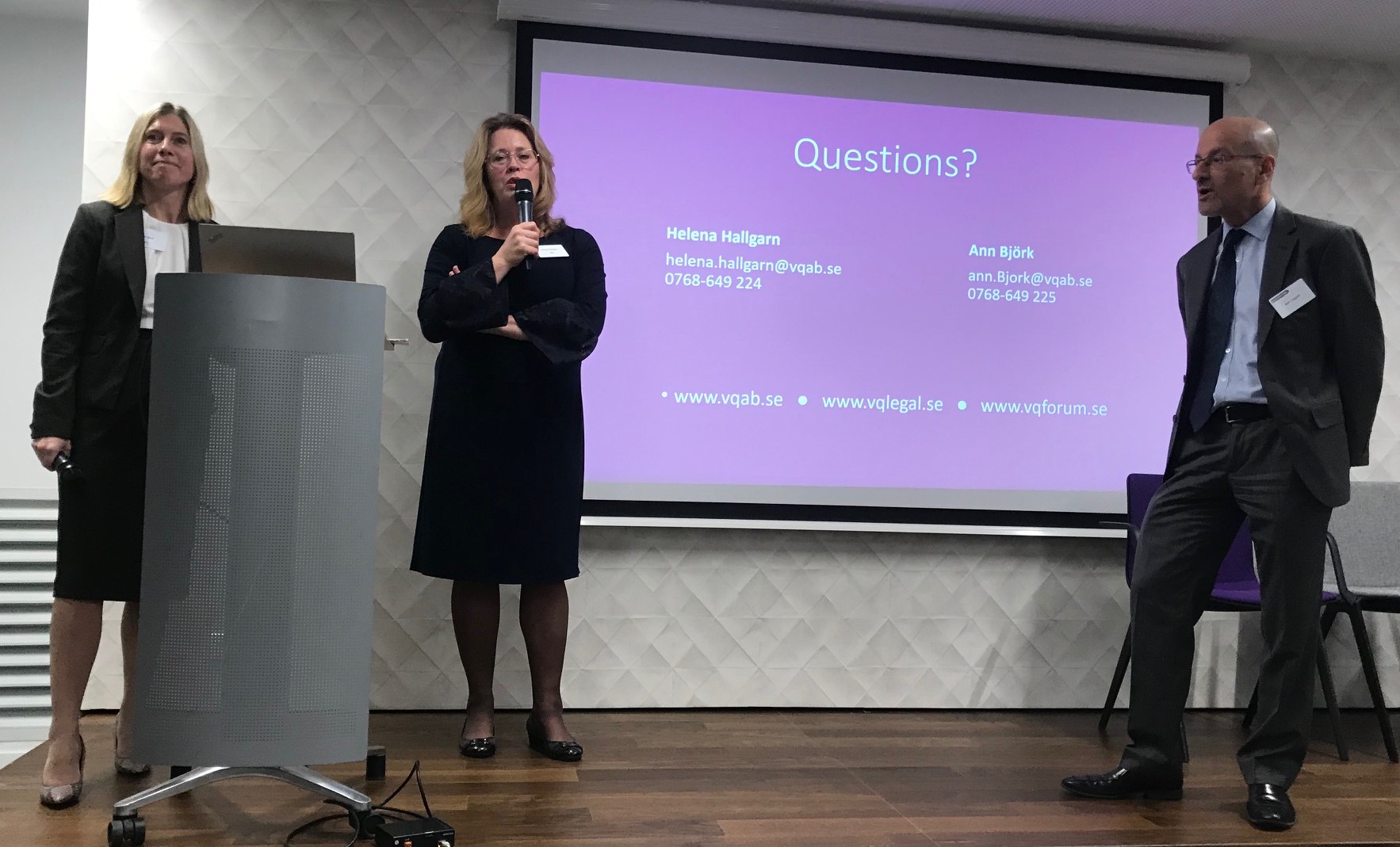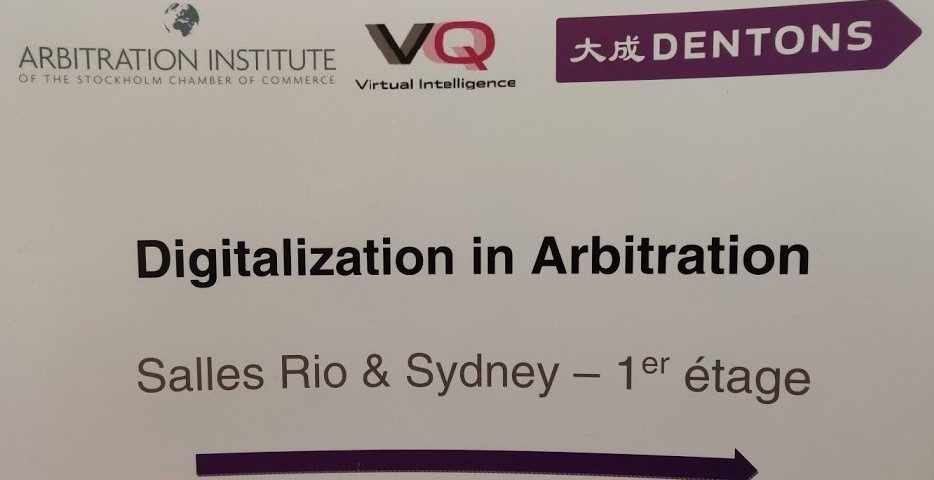The new digital arbitration platform was launched by the Arbitration Institute of the Stockholm Chamber of Commerce (SCC) in September 2019. During autumn 2019 and spring 2020, the SCC is going on a World Tour, discussing cyber security and digitalization within arbitration and showcasing the new SCC Platform. We are proud to be part of the World Tour and to share our input on digitalization and legal tech from a Swedish perspective.
On 16 December we participated in the SCC World Tour seminar on Digitalization and Arbitration in Paris. The seminar was co-hosted by the SCC and Dentons, and speakers included Bart Legum, SCC board member and partner and global co-chair, Dentons, Kathleen Paisley, partner, Ambos Lawyers, Helena Hallgarn and Ann Björk, founders Virtual Intelligence VQ, and Lise Alm, head of business development, SCC.

Bart Legum started off the seminar with the topic of going from analogue to digital in an arbitration practice, sharing some very useful advice and context to the complexities of international arbitral proceedings.
Kathleen Paisley then addressed the challenges from a cyber security perspective and data protection in arbitration, and how the move to a digital world creates new opportunities but also new risks, including data security risks. She explained how adequate information security is required as a matter of law for personal data wherever the GDPR or a similar data protection law applies. But information security is also required by most ethical rules, movement by arbitral institutions, and naturally, for the trust of clients. She also provided detailed and practical input on the GDPR requirements for data security and what is deemed as “appropriate” technical and organisational measures to ensure a level of security appropriate to the risk.
 We then provided a general overview of the developments of the legal market and the current legaltech hype. The legal services market has increased significantly the past years and only in USA it was estimated to be worth USD 437bn in 2017 (that is equivalent to 2% of US GDP) and in the UK to £33bn. The interest for investments and legaltech innovations is therefore understandable, with a lot of interesting initiatives going on. Within the law firm market there are for example innovation initiatives such as Allen & Overy’s Fuse, Cuatrecasas Acelerera and Mannheimer Swartling’s Innovation Lab, as well as numerous conferences and seminars on legal innovation, legal design and legal hackathons. And a record £62m of external investment already made in 2019 has taken total funding of UK legaltech startups to over £260m.
We then provided a general overview of the developments of the legal market and the current legaltech hype. The legal services market has increased significantly the past years and only in USA it was estimated to be worth USD 437bn in 2017 (that is equivalent to 2% of US GDP) and in the UK to £33bn. The interest for investments and legaltech innovations is therefore understandable, with a lot of interesting initiatives going on. Within the law firm market there are for example innovation initiatives such as Allen & Overy’s Fuse, Cuatrecasas Acelerera and Mannheimer Swartling’s Innovation Lab, as well as numerous conferences and seminars on legal innovation, legal design and legal hackathons. And a record £62m of external investment already made in 2019 has taken total funding of UK legaltech startups to over £260m.
In a recent research project at the Stockholm School of Economics by Frida Pemer on Digitalization of Expertise, it has been explored how professional service firms respond to digitalization and the potential threat of disruption. The result of this project, as well as of a survey conducted by the European Legal Tech Association, shows that so far, focus for legal innovation has been on efficiency and cost-squeezing though, not on innovation as a game changer to provide new disruptive kinds of legal services. To really change the industry, focus must shift to digitalization that transforms the business as such and not on individual technologies that support the business to be managed the same way, only faster. We provided details on the Technology Fallacy report and the findings from the 2015 Digital Business Global Executive Study and Research Project by MIT Sloan Management Review and Deloitte, and explained how innovation must focus on the three Ps – People, Processes and Programs.
In the new legal landscape, Law 2.0, the traditional law practice will be divided into different services provided by a mix of traditional law firms and new service providers. We can inter alia see that parts of traditional legal services will be replaced by legal online solutions, document review services, managed legal services and new legal services. Some examples of successful innovations already existing on the legal market, are legal online solutions such as LegalZoom and RocketLawyer, document review services such as JP Morgon’s use of contract intelligence, and the new legal service via the Atrium membership. Already in 2008, Professor Richard Susskind predicted in his book The End of Lawyers? that “Traditional lawyers will in large be replaced by advanced systems, or by less costly workers, supported by technology or standard processes or by lay people armed with on-line self-help tools.”

Just a few weeks ago, Richard Susskind published a new book focusing on online courts and the challenge with costly proceedings and access to justice. To quote Susskind “Even in the world’s most advanced jurisdictions, most civil disputes cost too much, take too long, the processes are antiquated, and the whole business is unintelligible to non-lawyers.” So, he therefore argues that the transformation can only be achieved through the use of technology and that in a digitalized society it makes sense for disputes as well to be conducted online. He suggests two lines of services can be provided through online courts: (i) online judging and (ii) extended courts.
Online judging involves the determination of cases by human judges but not in traditional courtrooms, but via online platforms. This is suitable for low value disputes like civil and family law cases. With the extended courts, Susskind means that technology can enable courts to deliver more than just judicial decisions. Like for example providing tools that can guide court users in legal issues and all options available to them or offer new kinds of non-judicial settlement like early neutral evaluation.
 Lise Alm then continued with a more detailed focus on digitalisation in arbitration and with an introduction of the SCC Platform, which is an excellent example of this new developments and how digitalization of litigation is already happening.
Lise Alm then continued with a more detailed focus on digitalisation in arbitration and with an introduction of the SCC Platform, which is an excellent example of this new developments and how digitalization of litigation is already happening.
The SCC Platform provides participants with a secure and efficient way of communicating and filing all case materials in the arbitration, such as procedural orders, submissions and exhibits, and will constitute the forum through which the SCC communicates with the parties, counsel and arbitrators throughout the proceedings.
Read more about the launch of the SCC Platform here: The First Few Months with the SCC Platform
(All photos by the SCC.)

